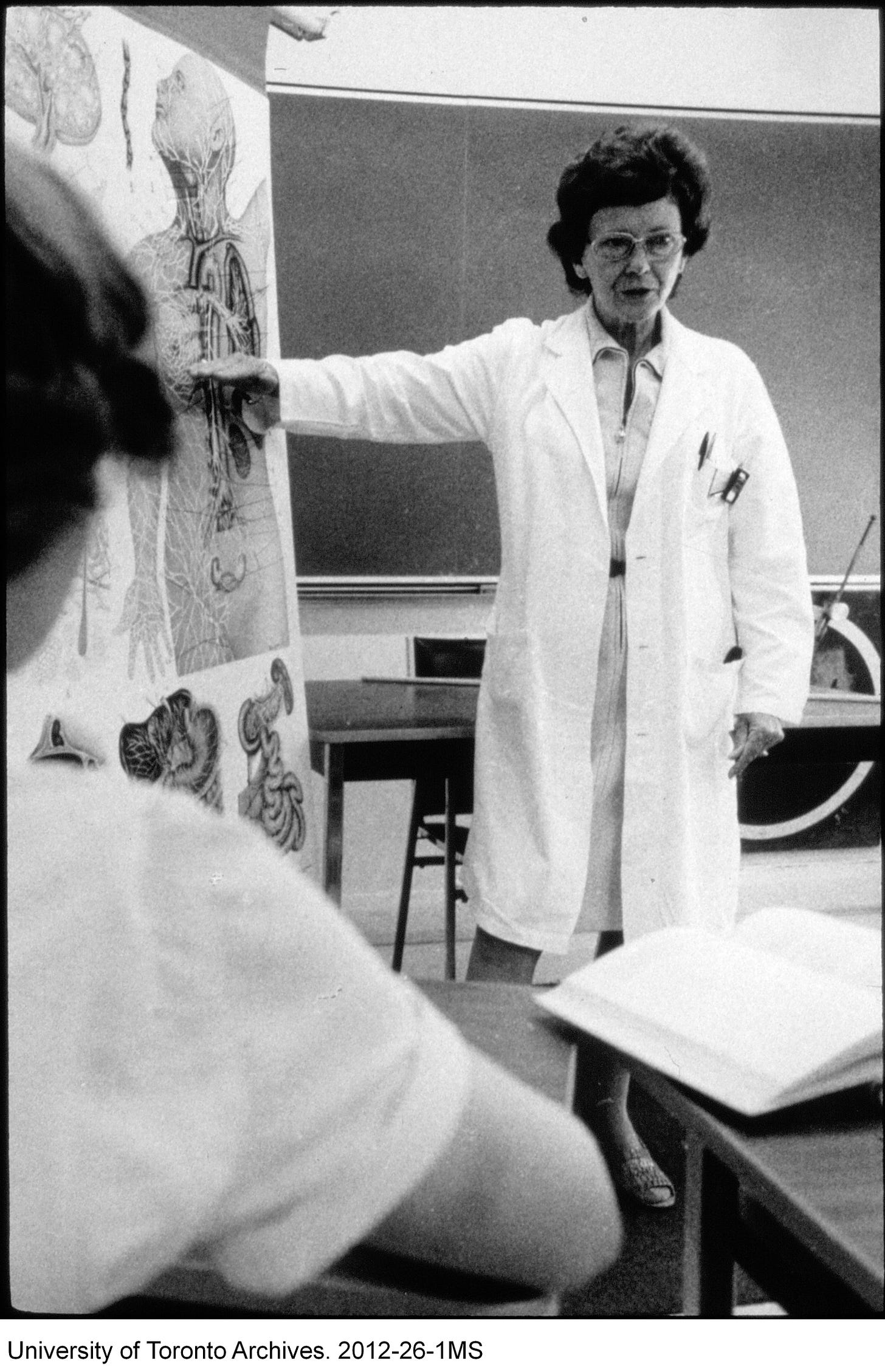The Radical Dr. Vera Peters
If often takes a woman
Considering how much we seem to be fond of them, men don’t have the best history when it comes to the preservation of female breast tissue. To this day, women’s health takes a distant second to that of men. I’m going to hypothesize male attitudes in the twentieth century toward breast cancer based on what I know of my gender. I expect many dudes who love breasts immediately stop doing so the moment they discover it’s “diseased.” Oh, no! My precious boner cannot abide something so beautiful being riddled with cancer. Lop it off! Lop it ALL off.
Of course, when it came to preserving women’s bodies in the face of a breast cancer diagnosis, it was a woman who led the way. It should not surprise you that her male colleagues fought her every step of the way.
Born in 1911 in a Toronto suburb, Dr. Vera Peters was an oncologist who received her medical degree from the University of Toronto in 1934. Back when she began her career, if someone was diagnosed with Hodgkin’s disease, now termed Hodgkin’s lymphoma, they were told to get their affairs in order and work on their flexibility so they could stretch far enough to kiss their own ass goodbye. To Dr. Peters, the Hodgkin’s death sentence was unacceptable.
She pored over the research, and in 1950 published a paper showing that most patients with Hodgkin’s lymphoma could be cured with high doses of radiation. At first, her research was ignored by the misogynistic fuckgiraffes of the medical establishment, but by the end of the decade they were taking it more seriously, and today Hodgkin’s lymphoma has a survival rate of over 90%. From “you gon’ die” to a better than nine out of ten survival rate is pretty goddamn impressive.
But Peters wasn’t finished.
Before she began her work, 98% of women diagnosed with breast cancer were treated via radical mastectomy, which is both physically and emotionally traumatic. It doesn’t just remove the breast, but most of the underlying pectoral muscle as well. While Peters was in medical school her mother had developed breast cancer and received such an overly invasive treatment. Often, women weren’t even consulted as to their options, but just had it performed as a matter of course. They had little medical agency.
Peters analyzed the data from 8,000 cases of breast cancer, showing that in many circumstances, the lumpectomy coupled with radiation for the treatment of breast cancer could be just as effective as a radical mastectomy. A lumpectomy is where only the cancerous tissue, along with a small amount of healthy tissue that surrounds it, is removed. Then radiation does the rest. In 1958 she moved to the Princess Margaret Hospital, which was the largest radiation treatment hospital on the continent. A decade later she presented her findings at a medical conference in the United States, and Peters said she was “refuted and shunned” by the surgeons in attendance. They viewed the radical mastectomy as the only treatment they would ever need to utilize, and how dare this mere woman tell them different.
Battling against the radical mastectomy as the only option wasn’t her sole radical endeavor. Dr. Peters also had the audacity to – *gasp* – consult with her patients about their treatment! She recognized their rights to understand their condition, the various treatment options, and seek a second opinion.
By the late 1970s, her pioneering research was taken more seriously, and the lumpectomy–radiation combo became an option for many women in need of treatment for breast cancer. What’s more, Dr. Peters became recognized as a pioneer in patient-centered care.
Vera Peters mentored many female doctors during her career. I expect she’d be pleased to know that today, most medical school graduates in Canada are women (my lovely wife is one of them).
Dr. Peters lived to be eighty-two. In 2010, she was posthumously inducted into the Canadian Medical Hall of Fame.
For all of history, men, and the institutions they dominate, have sought to control women’s bodies. This has negatively affected every aspect of women’s lives, including healthcare. Women must always fight an uphill battle against misogyny and patriarchy to assert their rights. When courageous women like Dr. Vera Peters take up the mantle, the result is the curing of disease.
Many thanks to my good friend Carrie King for her help with this piece.
This post is public so feel free to share this fucker, and also subscribe / upgrade to paid, get the fuckin’ Substack app, buy my fuckin’ book, et-fucking-cetera.





Thank you for this. It’s not only breast cancer but so many “women diseases” have been treated this way. The patriarchy does not take kindly to women outperforming them. Dr. Peters is to be commended for not taking their shit.
When I was 20 years old, back in the early Seventies, I got a lump in my right breast. I went to the only doctor I knew--a surgeon who I had met in the ER once when I needed stitches. He did an aspiration biopsy, and could get no fluid (cysts have fluid, tumors don't). So he scheduled me for an excisional biopsy, where they remove the lump and look at it under a microscope. He told me that before they could do so, I would have to sign a release allowing a radical if the frozen section came back positive, and that such sections were incorrect FIFTY PERCENT OF THE TIME!!! But that I wouldn't have to worry about it because he had been trained in Canada, and they knew that 5 and 10 year survival rates were the same for lumpectomy followed by radiation as for radical followed by radiation, so he would not do the mastectomy even if the frozen section came back positive, but instead wait the three days for the more precise test. But that I would HAVE to sign the release, because otherwise the hospital would not admit me for the surgical biopsy. As it turned out, I had fibrocystic disease, and the reason the aspiration biopsy did not show it was that the larges cyst in the mass was the size of a pinhead; the biopsy needle couldn't find a big enough cyst from which to withdraw fluid.
I was very, very lucky; most women did not find a doctor trained outside the US and had completely unnecessary crippling surgeries. Not only were they unnecessary because the surgery in most cases provided no survival benefit over the far less invasive lumpectomy, but because they were not even given the option of having the biopsy, getting the most accurate test results back, and THEN deciding if they wanted the radical or not. Talk about lack of agency!